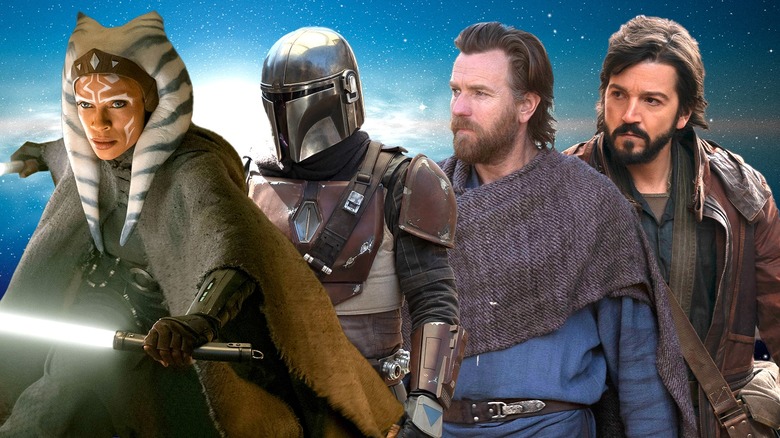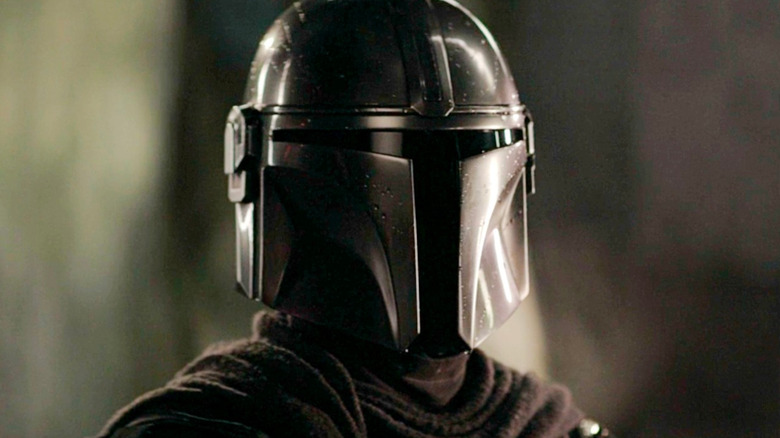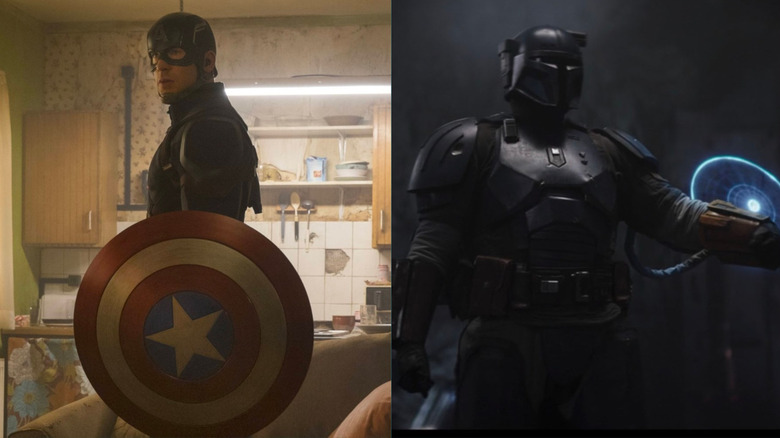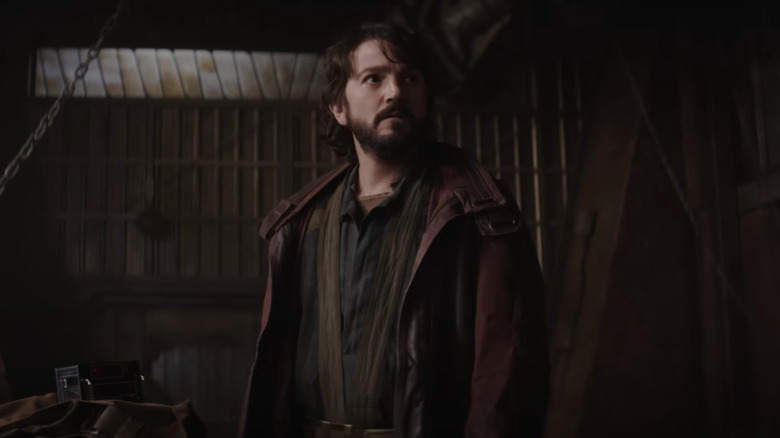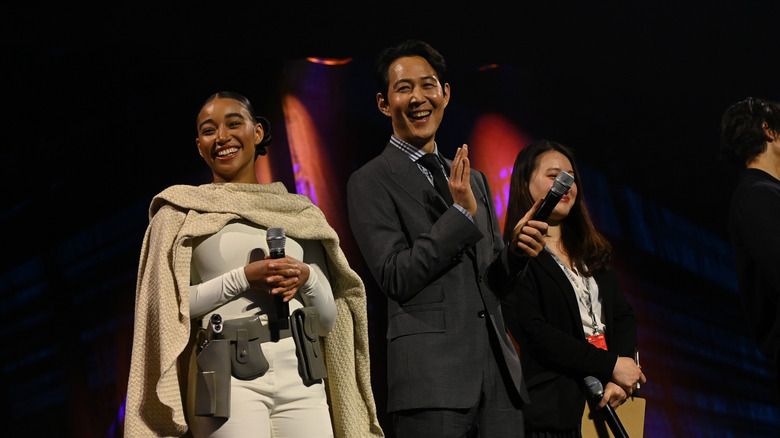Every Star Wars Show Has The Exact Same Problem
A wound at the center of the "Star Wars" universe won't heal, and it doesn't matter how many forgotten Jedi or cute alien babies are thrown into it.
It wasn't always this way. When Din Djarin of "The Mandalorian" first strolled onto our screens with Grogu at his side, it felt like the perfect new coat of paint — a fresh, yet familiar take on the galaxy far, far away. The Skywalker saga links were minor and not essential to the ongoing adventures of this brand-new bounty hunter. And oh boy, did we fall in love with this guy, and fast.
That was then. Now, with Season 3 at an end, shark-jumping accusations at the ready, and all the attention turned to Bo-Katan, it begs the question of which Mandalorian we are supposed to be focusing on. No disrespect to Katee Sackhoff's returned savior of Mandalore, but Din Djarin (Pedro Pascal) has taken a backseat in his own show. In a way, it's a taste of his own medicine, since he did the same thing in "The Book of Boba Fett" — that is, just linking one story to another, yanking attention away from the one viewers signed up for.
Herein lies the issue at the heart of every "Star Wars" show on Disney+ today, which isn't disappearing. Every mystery from the original movies, every question, and every potential subplot is being laid bare, while the series presents story after story that can't be viewed without the context of numerous other movies and shows. In this massive galaxy that's littered with alien species and fascinating societies, all the focus is on assembling puzzle pieces, but we rarely can spend time on any of the great individual pieces.
Star Wars shows keep looking to the past and future, but ignoring the present
Let's make it (kyber) crystal clear that no, we don't want to stop returning to the "Star Wars" universe. The problem is in the execution, which usually comes with baggage.
For example, in the case of Mando's recent third run, Admiral Thrawn was name-dropped mere days before Lars Mikkelsen was confirmed to be reprising his role from "Star Wars Rebels." Doing this would be pertinent if the show was about that, but it isn't — as written, it just dangled a tasty morsel of the future in front of us, making us look ahead to what's to come in "Ahsoka," while again (for the millionth time) drawing us away from the story we were being told ... which, by this point, is in such shambles that even Grogu's cute takeaways can't save it. By Chapter 24, even Din Djarin seemed checked out. Who can blame him? Bo Katan has the spotlight, and she's kicking the ball toward the goals of future shows and movies.
Look, the Marvel Cinematic Universe clearly pulled this off, and changed cinema while doing so. But "Star Wars" is not the MCU, and this increasingly common trend hinders rather than helps the "Star Wars" franchise. Like it or not, casual audiences aren't as tuned in to the expanded side of this particular universe. As a result, when names like Admiral Pellaeon or a space whale sighting are made, it isn't enjoyable for most viewers; instead, it just means they're pausing their Disney+ account to go run a Google search. Fun, right? When we compare this to the home of Earth's Mightiest Heroes, there's a stark difference — the MCU got people deeply invested in individual stories before tying them together.
Star Wars is trying to apply the MCU mold, and it's cracking with every installment
When you already own a franchise that has banked billions thanks to its world-building movie model, applying it to "Star Wars" probably felt like an easy win. However, unlike the Marvel Cinematic Universe, which eased viewers into its world and explained everything onscreen without required reading, the Disney-era "Star Wars" is like calculus homework.
All of the "Star Wars" shows on Disney+ pull not just from the three Skywalker trilogies, but also Dave Filoni's "Star Wars: Clone Wars" (that's over 100 episodes of TV). With the likes of "Obi-Wan Kenobi" and "The Mandalorian," names like The Inquisitor or Cad Bane are getting thrown into the mix and not contributing as much as they should for stories that viewers should be gripped by. By including these Filoni-fueled deep cuts, the shows are leaving viewers bogged down, with many increasingly experiencing "Star Wars" as a chore.
If "Star Wants" wants to follow the Marvel model, it must recall the MCU's early days, not Phase 3. Back then, Easter eggs and crossovers were done sparingly, with links between the stories being subtle and not required for enjoying any individual film. It was only as the years went on — and as Tony Stark and Steve Rogers' arcs progressed — that it led to a literal endgame rife with nods to threads which audiences had spent 20+ films and 11 years getting sucked into.
The difference was that by that point, we were all — for the most part — on the same page. That's not where "Star Wars" is. Plenty of fans of "The Mandalorian" did not watch "The Book of Boba Fett," and the latter show ruined "The Mandalorian" for them.
Andor is the only Star Wars show that turns this problem into an asset
Just like its rebellious central character, "Andor" breaks from the pack.
On the surface, it has the same shared universe pitfalls — yes, it's bound by preexisting narratives and intrinsically linked to them ("Rogue One" and "A New Hope," to be precise). But instead of leaning hard on lore-linking moments and clunky character inclusions, "Andor" just uses its place in the galaxy as a backdrop. Throughout the first season, it remained a show that wasn't so much unaware of the universe it was a part of — it simply didn't care.
Tony Gilroy's show was too busy providing a commentary on the social and class divide to shoehorn in references. When it did, they were fleeting moments of little importance. Yes, between prison breaks and civil unrest, there are minute mentions of the Emperor, and standalone meetings with Saw Gerrera (Forest Whitaker), but these are the equivalent of Tony Stark meeting with Thunderbolt Ross in "The Incredible Hulk." The link is cool, and "Star Wars" fans can enjoy Saw Gerrera, but if you don't know him? You're fine. What matters is the story of "Andor."
It's a brutal twist of irony, then, that a show that went against the grain suffered because of what came before it. "The Book of Boba Fett" existed to move pieces of "The Mandalorian" story around, which led to audiences not being as psyched when Diego Luna's charming rebel returned. We were fools for it. "Andor" takes the route other "Star Wars" shows should learn from, investing all viewers in characters that are more than just links in a chain.
Admittedly there's a high chance that the next scheduled show, "Ahsoka," won't have learned that lesson. However, the one that follows it might be our saving grace.
The Acolyte could be the show that restores balance to Star Wars TV shows
Given that the Rosario Dawson-starring show "Ahsoka" is guaranteed to be all tied up with links to "Star Wars Rebels," the likelihood of it being crammed with winks and nods to its cartoon precursor is very high. Outsiders needn't worry, though, because, as Yoda once said, "There is another."
The show that could share the weight that "Andor" carried will hopefully be "The Acolyte." Together, "Andor" and "The Acolyte" could right the ship, and hopefully take "Star Wars" off its tiresome Easter egg hunt. Why? The reason this highly-anticipated show could be the perfect cure is its place on the timeline — a new setting, distanced from the events of the Skywalker Saga by 100 years. That means no cameos from current shows, no plot threads it can get tied up in, none of that — just a brand-new story from an ancient era. Perfect.
That's the hope, anyway. Maybe with the addition of lightsabers and robed figures fighting one another, "The Acolyte" could bring balance to the force, by giving us a great story that entertains casual fans as much as it does those who wear Mandalorian helmets at home. Doing so could help remind the brains behind this franchise, as well as the fans, that — as steeped in lore as "Star Wars" already is — this is set in a galaxy, after all, and not a trash compactor.
